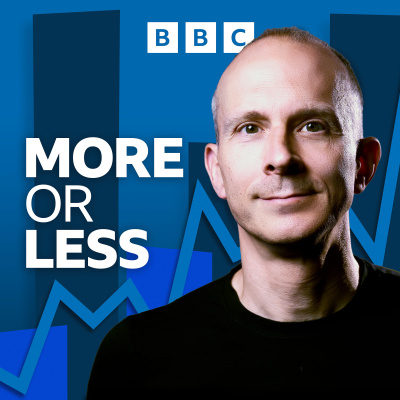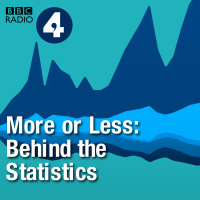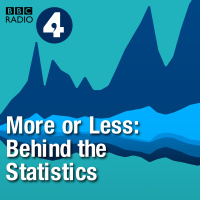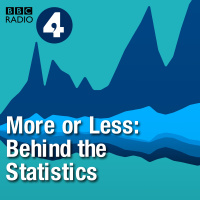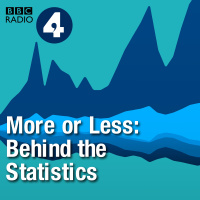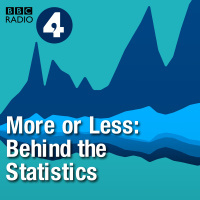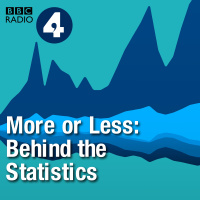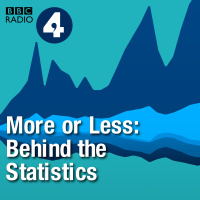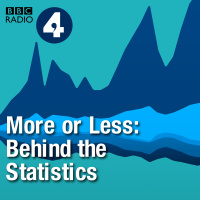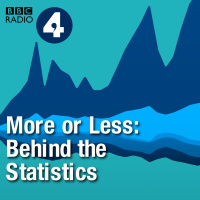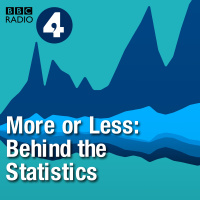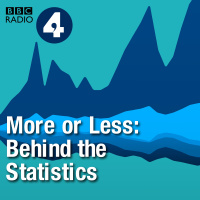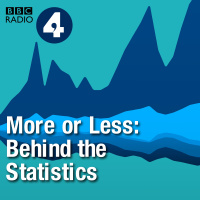Sinopsis
Tim Harford and the More or Less team try to make sense of the statistics which surround us. From BBC Radio 4
Episodios
-
Where could we fit the entire world’s population?
10/08/2013 Duración: 09minIf all the world’s population crowded together, where could we all fit? London? Texas? More or Less figures it out, and separates fact from fiction. And, as the soccer season returns, is it possible to measure the effectiveness of a team’s manager? We hear from David Sally, author of The Numbers Game. This programme was first broadcast on the BBC World Service.
-
What is the most visited country in the world?
03/08/2013 Duración: 09minThis week we find out what the most visited country in the world is and ask why aren’t they capitalising financially as well as their rivals. Plus we also investigate the complex - and often controversial - web of international extradition treaties. The programme hears from extradition lawyer Anand Doobay, from Peters and Peters, and Ted Bromund, a senior research fellow in Anglo-American relations in Washington DC. This programme was first broadcast on the BBC World Service.
-
Chris Froome's Tour de France victory
27/07/2013 Duración: 09minThe winner of this year's Tour de France, British rider Chris Froome, faced numerous questions about doping during the course of his victory. More or Less assesses his performance stats, and asks whether maths can measure whether cycling really has cleaned up its act and whether Froome is simply a victim of the ghosts of cycling's past. Dr Ross Tucker from The Science of Sport website gives us his views and we hear from physiologist Fred Grappe - the only man to see Froome's tour data. This programme was first broadcast on the BBC World Service.
-
Egypt: Biggest protest in history?
13/07/2013 Duración: 09minIt’s claimed that Egyptians have taken part in the biggest uprising the world has ever seen. The nationwide demonstrations, which were followed by the removal of the president by the army, were certainly a massive show of people power. But were the crowds really as large as reported? Ruth Alexander assesses the evidence, and finds out why it is so difficult to count a crowd. This programme was first broadcast on the BBC World Service.
-
Sex and the world wide web
06/07/2013 Duración: 09minThe world of porn is often exaggerated but does it really make up 37% of the web? And after some high profile cases we ask whether the American football league has a crime problem? This edition was first broadcast on the BBC World Service.
-
How long will you live?
29/06/2013 Duración: 09minLife expectancy at birth around the world has increased by six years in the past two decades. But can this striking trend continue? Ruth Alexander looks at the data. This edition was first broadcast on the BBC World Service.
-
Will 40% of the world's workforce really be in Africa by 2050?
22/06/2013 Duración: 09minRuth Alexander examines US Secretary of State, John Kerry’s claim that 40% of the world’s workforce will be in Africa by 2050 and talks to the chief of the United Nations’ population division about its projections for 2050 and 2100. The programme also examines the final scene in The Fast and the Furious 6, the global box office sensation. How long must that runway have been at the end of the film? This programme was first broadcast on the BBC World Service.
-
Is a child dying of hunger every 15 seconds?
15/06/2013 Duración: 09minRuth Alexander examines the claim that every 15 seconds a child dies of hunger. It’s a popular statistic used by celebrities and charity campaigners in support of the Enough Food for Everyone IF campaign. It conjures up the image of millions of young children starving to death. But is this really the case? This programme was first broadcast on the BBC World Service.
-
Sex on the Brain?
10/06/2013 Duración: 09minParents take note – what can numbers reveal about bringing up children? Plus, Tim Harford explore if men really do think about sex every seven seconds. This urban myth will not go away and yet pinning down any evidence proves a challenge for the More or Less team.
-
A&E, and the chances of having twins
07/06/2013 Duración: 28minA&E waiting times have been making the headlines - Tim Harford takes a look at some of the numbers and puts them into context. Today presenter Evan Davis explains his frustration with finding official statistics online. We explore if men really do think about sex every seven seconds. Plus, what are the chances of having twins?
-
The maths of spies and terrorists
03/06/2013 Duración: 09minIn the wake of the Boston Marathon bombing and the killing of a British soldier on the streets of Woolwich in London, it emerged that the suspects were known to the security services. But how feasible is it for the authorities to keep track of everyone on their watch list? Tim Harford crunches the numbers, with the help of the former head of the UK intelligence service MI5, Dame Stella Rimington.
-
The maths of spies and terrorists
31/05/2013 Duración: 24minAfter the killing of a British soldier on the streets of Woolwich in London, it emerged that the suspects were known to the security services. But how feasible is it for the authorities to keep track of everyone on their watch list? Tim Harford crunches the numbers, with the help of the former head of MI5, Dame Stella Rimington. Plus: a listener requests a cost-benefit analysis of kidney donations; and Johnny Ball gives the Apprentices a maths lesson.
-
Ryanair punctuality; mistakes in academic papers
27/05/2013 Duración: 09minTim Harford examines Ryanair’s claim that more than 90% of its flights land on time; and discovers that millions of scientific papers may be incorrect. Producer: Ruth Alexander
-
The economics of Scottish independence
24/05/2013 Duración: 24minTim Harford inspects the claims the UK Treasury and the Scottish government make about the economics of an independent Scotland; tests Ryanair’s claim that more than 90% of its flights land on time; re-runs the Eurovision song contest, excluding the votes of the former Soviet countries to test whether political alliances are affecting the final results; discovers that millions of scientific papers may be incorrect; and learns more about dog years – and cat years.
-
Angelina Jolie’s 87% cancer risk
20/05/2013 Duración: 09minAs Angelina Jolie announces that an 87% cancer risk has prompted her to have a double mastectomy, Tim Harford assesses the probabilities associated with the disease. Plus, has the UK been hit by a Romanian crime wave?
-
Angelina Jolie’s 87% cancer risk
17/05/2013 Duración: 24minAs Angelina Jolie announces that an 87% cancer risk has prompted her to have a double mastectomy, Tim Harford assesses the probabilities associated with the disease. Plus, has the UK been hit by a Romanian crime wave? Also in the programme: Education Secretary Michael Gove’s use of PR surveys; and why the UK’s poor growth has not had led to the high levels of unemployment that economists would expect.
-
How old is your dog?
13/05/2013 Duración: 09minIt's often said that one dog year equals seven human years. But is it true? Tim Harford and Ben Carter unveil the More or Less Dogulator. Plus, 15 distant relatives of England’s King Richard III are petitioning the High Court about where the king should be buried. Some reporting has implied that the famous 15 are almost the only descendants of Richard III who exist. But mathematician Rob Eastaway figures out how many other relatives of Richard III might actually be out there.
-
How much does the EU cost the UK? Plus, dog years
10/05/2013 Duración: 27minTim Harford makes sense of the numbers being used in the political battle about the UK and its membership of the EU. And, he looks at whether it’s true that more war veterans kill themselves than die in combat ; why you could well be a descendant of Richard III; and what Margaret Thatcher’s funeral really cost. Plus, is it true that one dog year equals seven human years? Tim unveils the More or Less Dogulator.
-
The Maths of Mozart and Birds
06/05/2013 Duración: 09minBirds + windows =? The BBC Quiz show The Unbelievable Truth reckons that more than 2 million birds die crashing into window panes every day in the US. Tim Harford finds this, well, unbelievable. Marcus du Sautoy explores the maths in Mozart's The Magic Flute; a student who uncovered a mistake in a famous economic paper, which has been used to make the case for austerity cuts, explains how he did it.
-
Birds, Mozart, austerity, Thatcher
03/05/2013 Duración: 28minBirds + windows =? The BBC Quiz show The Unbelievable Truth reckons that more than 2 million birds die crashing into window panes every day in the US. Tim Harford finds this, well, unbelievable. Marcus du Sautoy explores the maths in Mozart's The Magic Flute; a student who uncovered a mistake in a famous economic paper, which has been used to make the case for austerity cuts, explains how he did it; and separating fact from fiction about Margaret Thatcher with a look at the numbers of her time in office.
